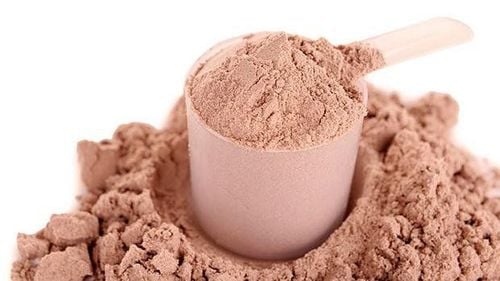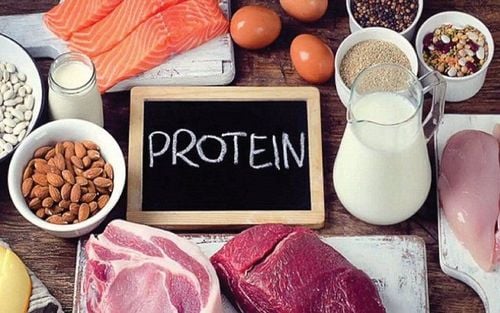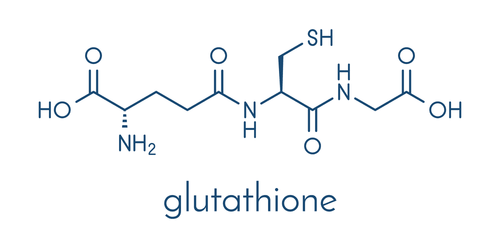This is an automatically translated article.
There are many different types of protein powder on the market. The sources of these protein powders can range from rice and hemp to insects and meat. But two of the most popular and still appreciated over the years include: casein and whey protein. Although both are derived from milk, they have a lot of differences.
1. Dairy products
Casein and whey are two proteins found in cow's milk, accounting for 80% and 20% of milk protein, respectively. Both are high-quality proteins, as they contain all the essential amino acids, which the body cannot produce on its own. In addition, these two proteins are also believed to be easily digested and absorbed in the human digestive system.Also, both casein and whey are byproducts of cheese production. During cheese making, special enzymes or acids are added to hot milk. These enzymes or acids cause the casein in the milk to coagulate, or turn solid, from the liquid.
This liquid is whey protein, which is then washed and dried into a powder form for use in food products or dietary supplements. The casein curd can be washed and dried to make a protein powder or added to dairy products, such as cheese.

Casein và whey là hai loại protein có trong sữa bò
2. Whey protein helps build better muscle
Whey protein is not only a better choice during training because of its quick absorption, but also due to its large amino acid content. Whey protein contains more branched chain amino acids (BCAAs) leucine, isoleucine and valine, while casein contains a larger portion of the amino acids histidine, methionine and phenylalanine.While all of the above amino acids are essential for building muscle, leucine is an important starter in the process.
Thanks to its higher leucine content, whey protein stimulates protein synthesis in muscle groups, promoting muscle growth more than casein, especially when consumed in tandem with exercise.
3. Benefits of Whey Protein
Whey protein contains several active proteins called immunoglobulins that help strengthen the body's immune system.
Immunoglobulins are known to have antibacterial properties, helping to eliminate or slow the growth of harmful bacteria, such as bacteria and viruses. Animal and test-tube studies have also shown that these proteins have antioxidant effects and inhibit tumor and cancer growth. In addition, some immunoglobulins transport important nutrients such as vitamin A in the body and enhance absorption of other nutrients such as iron.

Whey protein giúp tăng cường hệ thống miễn dịch của cơ thể
4. Benefits of Casein Protein
Casein protein contains several bioactive peptides that have been shown to benefit the human immune and digestive systems.
Certain biopeptides found in casein also have a positive effect on the heart by aiding in lowering blood pressure and reducing the formation of blood clots.
These peptides work similarly to angiotensin-converting enzyme (ACE) inhibitors, a class of drugs commonly prescribed to control blood pressure. They also contain minerals like calcium and phosphorus, which improve protein digestibility in the stomach.
5. The role of protein in the diet
Protein plays many important roles in supporting the health and functioning of the body.
These roles include:
Enzymes: Proteins carry out chemical reactions in your body. Antibodies: Eliminate invaders, such as viruses, to help fight infection. Signaling: Many proteins act like hormones, assisting in signaling to cells. Structure: Proteins support the structure of the body's skin, bones, and tendons. Transport and storage: Protein moves substances including hormones, drugs, and enzymes throughout the body.

Protein có vai trò quan trọng trong hỗ trợ sức khỏe và hoạt động của cơ thể
In addition to basic nutritional functions in the body, protein has a number of other benefits including:
Fat loss: Protein aids in fat loss by reducing appetite and boosting metabolism. Blood sugar control: Protein, when consumed in place of carbs, can improve the glycemic index in people with type 2 diabetes. Balances blood pressure: Studies show that people who consume a lot of it. Protein, regardless of origin, usually has a lower blood pressure reading. Even so, these benefits are proven based on a higher total protein intake in general, not necessarily casein or whey protein.
6. The right choice
The nutritional value of each type of protein is also one of the factors that help users choose the right product for their needs.
Per standard scoop (31 grams, or 1.1 ounces), whey protein contains:
Calories: 110 Fat: 1 gram Carbohydrate: 2 grams Protein: 24 grams Iron: 0% Reference Daily Intake (RDI) Calcium : 8% RDI

Giá trị dinh dưỡng trong từng loại protein là khác nhau
Per standard scoop (34 grams, or 1.2 ounces), casein protein contains:
Calories: 120 Fat: 1 gram Carbohydrate: 4 grams Protein: 24 grams Iron: 4% RDI Calcium: 50% RDI However, The nutritional value of both proteins varies depending on the specific product and brand.
Some other factors that help users consider choosing between these two proteins include:
Casein protein powder is more expensive than whey Whey protein powder has better water solubility than casein. Whey protein powders typically have a good consistency and taste to casein. Customers can also purchase protein blends, which often contain a combination of casein and whey. Alternatively, it's also common to buy both the powders individually and take a whey protein powder during workouts, then take casein before bed.
7. Usage
User can mix each with water or milk. Milk will make the protein mixture thicker than when used with water.
If possible, the user should mix the protein powder and liquid in the blender to ensure the flavor and texture of the mixture. Users are advised to always add liquid before adding protein to keep the protein from sticking to the bottom of the cup or blender.
Please dial HOTLINE for more information or register for an appointment HERE. Download MyVinmec app to make appointments faster and to manage your bookings easily.
Reference article: Healthline.com













